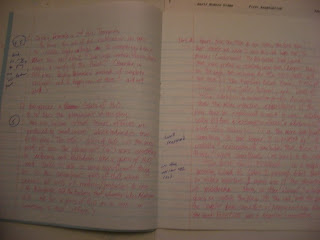Ok, I'm fretting, among other things, over a voice check/evaluation that we are supposed to have in a week or two. I think the last time I've done one of these was shortly after I joined. It has probably been around 4 years since my last one--enough time for him to forget that I'm a dismal sight reader--if he knows this at all.
Sometimes, if a piece is in the right key (=keys with sharps in the key signature), then I can sort of fake it, b/c if the piece is straightforward enough, I can mentally finger the notes and imagine the pitch, etc., which is what I did when I auditioned. He gave me a piece in the key of d (major), and all of the notes fell on the a or d string, and the rhythm was straightforward, the intervals were straightforward (fifths, fourths, thirds), so I kindof fudged my way through it, and I saw him write down on my notes "excellent" under sight reading. Ha! If only he knew. . ..
This isn't false modesty or anything, but I seriously cannot sight read to save my life. I blame it on my former Suzuki training, which I wouldn't necessarily change; it's just that I resisted learning to read music for the longest time, since I was far more efficient at picking things up by ear, and now wish that I started the whole sight-reading thing earlier. Or heck, wished that I had learned to play the piano instead, since pianists are fabulous sight readers.
Anyway, if my director decides to pick a piece with 5 flats, I'm screwed. If he picks a minor key w/ 5 flats, I'm doubly screwed, though truth be told, I'm less fretting about the probability of him picking a piece with 4 or more flats as our sight-reading piece, than I am about him hearing me and finding out that I'm a fluke. (Sigh.)
I mean, my singing is ok. Not solo-singing material, and sure, I can sing (I think/hope) in tune, for the most part. In fact, the one thing I am good at (I think) is intonation. I suppose I did get into this choir once, but unlike many of the people in my choir, I don't have formal training in music and I haven't taken private voice lessons (except a handful of lessons here and there a few years back) to know whether I'm breathing, singing, properly, etc.
So while I guess it's a good thing that he's making sure our singing doesn't go to hell (and I haven't been in the choir long enough to know whether this is used as a potential weeder or just a formality), I'm still nervous, since he's also extremely nitpicky and demanding, which are normally traits I admire--just not when listening to me singing solo.
* * * * * * *
Well, I guess I don't have to worry about "flunking" my voice check, since I emailed my director and told him that I was afraid he might find out that I'm a fluke, and he just wrote back ":) no way jose." Awww. Isn't that terribly sweet? (Not that this lessens my anxiety.)


